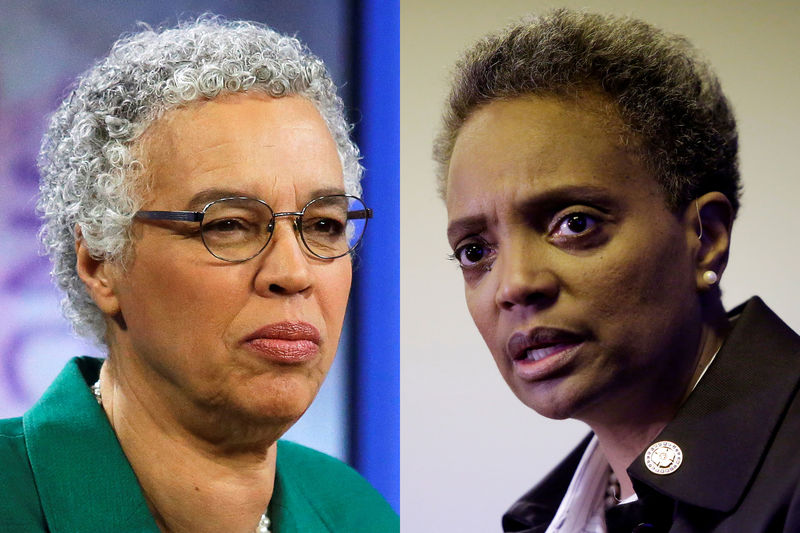By Brendan O'Brien and Karen Pierog
CHICAGO (Reuters) - Chicago voters went to the polls on Tuesday to choose between two African-American women running for mayor, with the winner of the historic vote inheriting a city steeped in violent crime and wracked by fiscal woes.
Lori Lightfoot, 56, the former president of independent civilian body the Chicago Police Board and a political outsider, faces Toni Preckwinkle, 72, a long-time local politician, in a runoff to become the 56th mayor of the third-largest U.S. city.
“I voted for Lori Lightfoot ... I think the other one, Preckwinkle, is in politics too long. You know, too much of a machine," said John Reyes, 71, speaking outside of a polling place in the Albany Park neighborhood.
The victor will become the first African-American woman to lead Chicago, a rarity in the United States, where only 6 percent of mayors in the 200 U.S. largest cities are women of color, according to the Reflective Democracy Campaign.
The two earned spots on the ballot after they garnered the most votes among 14 candidates in a February election. The winner will replace Rahm Emanuel, who announced in September that he was not seeking a third term.
Lightfoot would also become the first openly gay mayor in Chicago. She has never held political office, while Preckwinkle was a city councilwoman for almost 20 years before becoming Cook County board president in 2010.
Dennis Williams (NYSE:WMB), a 57-year-old city employee from the Beverly neighborhood on the city’s far South Side, said he prefers Preckwinkle because of her experience.
“People talk about change but don’t understand that there is a lot to deal with on the day-to-day business, like snow plows," Williams said during an event on Saturday at the Rainbow PUSH headquarters, where both candidates agreed to unite after the election.
Tuesday's winner will take over a city ranked as one of the nation's most violent. Homicides in Chicago declined by more than a quarter in 2018 from its five-year high of 769 in 2016. But less than one out of five murders was solved in Chicago in the first half of 2018, according to local media.
"I have been very, very clear that this is unacceptable," Lightfoot said during a debate last week held by a local CBS affiliate. "Our detectives have to get out of their offices and get into the community."
Preckwinkle said the city must invest more in community policing and police training.
"The way crimes get solved is that officers get cooperation and collaboration from community members," she said.
Neither candidate has disclosed detailed plans for addressing a projected $252 million fiscal 2020 budget deficit and escalating pension payments that will top $2 billion in 2023.
Preckwinkle and Lightfoot both support an elected rather than a currently appointed board to govern the debt-dependent Chicago Public Schools, which is controlled by the mayor.
The next mayor will be expected to deliver on a campaign promise to reform the police department currently under court-appointed oversight to address a 2017 Justice Department finding of widespread excessive force and racial bias by officers.
On day one, the new mayor will also have to find a way to ease tension between the police department and state's attorney after prosecutors decided to drop charges against actor Jussie Smollett, who was accused of staging a hate crime attack.
Both candidates are calling for a fuller explanation from the state's attorney's office regarding the case.

"Whomever gets in will have a hard time," said retired mailman Gary Muckle, 77, after voting for Lightfoot this weekend.